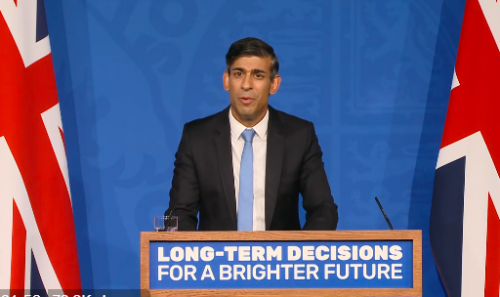Business reacts to Conservative manifesto launch

The Conservative Party election manifesto has received a mixed reaction from business voices, many of whom applauded some of the initiatives in the document, but said it lacked a cohesive vision of what another five years of a Rishi Sunak led government would look like.
Juergen Maier, chair of Digital Catapult and the former CEO of Siemens UK said on Twitter (X): “It’s strong on innovation, especially on tech like AI. Tremendous to see the recognition of the role of Catapults in scaling up innovation.
“It mentions a few focus sectors notably, Automotive, Fintech, Offshore wind. It also mentions a few key Infrastructure investments and I’m pleased about the re-commitment to Northern Powerhouse rail.

Juergen Maier
“To me, however, none of it hangs together well. There is no Industrial or Infrastructure strategy, that makes the most of our Infrastructure investments and from that maximising local industries and jobs. It also contains very mixed messaging regarding our commitment to net zero.
“It’s really more of the same, and I don’t think it’s enough to shift the dial on business confidence, investment and productivity.”
On the pledge to build more homes, there was scepticism from the chartered surveyors organisation RICS.
Justin Young, CEO at RICS, that the pledge to build 1.6 million was “ambitious” given on only 2.5 million homes have been built over the last 14 years: “1.6 million homes over the next five years … is over 300,000 new homes a year – which hasn’t been achieved since the sixties, a period during which the public sector and SME housebuilders had a far greater role in housing delivery.
“While it’s encouraging to see the Conservatives committing themselves to supporting small builders, this will not address the quagmire of laws that make up Britain’s restrictive and politically permeated planning system.”
The National Federation of Builders also said there was much to welcome, but Rico Wojtulewicz, the Head of Policy said there were concerns over “the commitment to brownfield and greenbelt protection”, as he said it is based on ‘gentle density’ in major cities and not ‘community density’ as the NFB has set out in its manifesto.
“This is because development built to a maximum of ten storeys, the gentle density definition, will pass the housing crisis on to the next generation as too few homes will be built, with mixed developments made broadly unviable. The NFB’s ‘community density’ approach ensures that in major cities, residential and non-residential needs are made viable in a well-designed and thoughtfully planned development.
“There is much to welcome in the manifesto, particularly on apprenticeship and technical education; however, much of it was already on the table and policies that are currently decimating SMEs, such as the viability killing Biodiversity Net Gain not being reformed. Small builders will likely conclude that if the Conservatives were to win the next election, they would experience another parliamentary term of warm words but no action.”
Daniel Särefjord, CEO of Aira UK, a clean energy tech supplier said he was disappointed to see so many references to gas as a future energy source.
“The Conservatives plan to make the UK a net exporter of electricity, suggesting that any future Rishi Sunak-led government would recognise the importance of decarbonising the energy grid. Access to cheaper electricity will power the country’s transition to heat pumps, which are four times more energy efficient than gas boilers and will reduce families’ heating-related carbon emissions by 75%, a number that rises to 100% with renewable electricity.
“Delivered in the right way, reducing green levies on the cost of electricity will improve the economics for families who choose to go gas-free. Although there is a commitment to invest £6 billion in home efficiency, the manifesto’s energy section contains around half a dozen references to gas, granting more gas exploration licenses and building gas-fired power stations, suggesting to clean technology investors that we shouldn’t expect a dramatic reduction in the UK’s fossil fuel dependency any time soon.”






